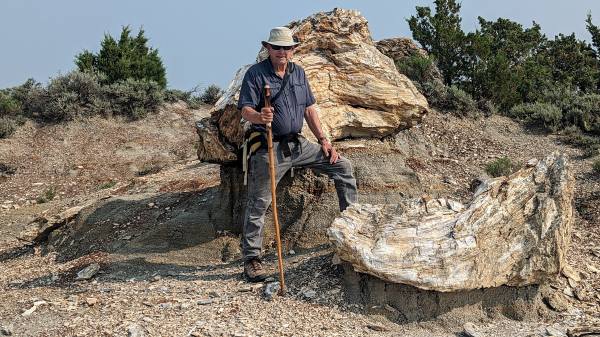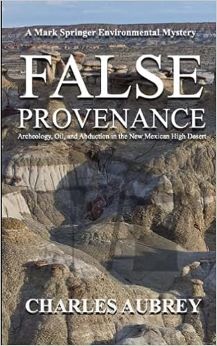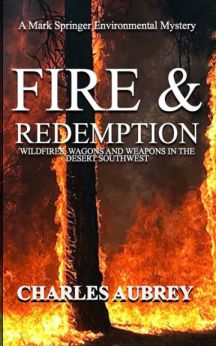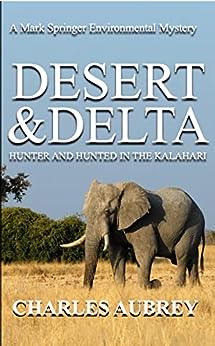Meet Charles Perrings, ASU Professor and Mystery Novelist
By: Matt Tontonoz
Biology and Society Professor Emeritus Charles Perrings joined ASU in 2005. He is an environmental economist who works across the disciplines of economics, ecology, and mathematics. His research has focused on the relationship between economic activity and environmental change, including biodiversity loss and the spread of human, animal, and plant disease. At ASU he co-directed the Ecosystems Services Lab with ecologist Ann Kinzig.
The author of hundreds of academic articles and books, Perrings has an unexpected hobby: writing mystery novels.
He’s published three so far and is working on a fourth. The novels explore mysteries that revolve around environmental issues and seamlessly blend science and storytelling. Perrings writes under the pseudonym Charles Aubrey.
I spoke with him in July of 2023 about what drew him to this form of writing.
How does a professor of environmental economics come to be the author of mystery novels?
The motivation is simple. Environmental issues are complicated. The way we write about them in scientific journals is inaccessible to most people. I wanted to communicate information about environmental issues to a wider audience, using storytelling. There are many issues out there waiting to be wrapped around a tale of some kind. My hope is that the tale attracts people to read and, in the process, to learn.
Is there something about the genre of mystery that lends itself particularly well to these sorts of environmental issues?
Mystery and academic research have something in common. Think about what we’re doing as researchers. We’re solving puzzles all the time. That’s what we do. We identify a problem, we figure out the best way to investigate that problem, and then we report the investigation. So there’s a fairly natural affinity between the mystery genre and the way that we do research.
In mysteries, you often have good guys and bad guys. Do those tropes operate in your mysteries as well?
It’s almost never true that there are wholly evil people. There are people who’ve got good and bad sides to them, and there are people who do bad things without themselves necessarily being fundamentally bad people. Many more of us just make bad decisions. We are not hell bent on causing mayhem, but nevertheless we do just that.
The reason I’ve framed the books in the way I have, is that if you want to get people to read a tale, it needs to look in some ways like other tales. It needs to feel familiar enough that readers can get their heads around it. The way I’ve structured my books will hopefully feel somewhat familiar to people who are already addicted to mysteries of one kind or another.
In the environmental issues I explore, people are the drivers of change, and people bear the costs of change. All involve a human story embedded in a story about environmental change. The human story depends on actors, some of whom are somewhat malevolent, and some of whom are just ill informed. The protagonists in the stories have an interest in trying to figure out what the problem is, and then to figure out whether or not there’s a solution to it.
Did you have a previous history of writing novels for fun and then decide to try to get them published?
No, no. This just happened in the last three years since I retired.
So one day you just said to yourself “I'm going to publish a mystery novel” and then you did?
There are different routes to publication. Some are laborious, time consuming, and involve multiple intermediaries, and some are not. These are published through Amazon’s Kindle Direct Publishing. [Editor’s note: the Kindle versions are free if you have a Kindle Unlimited subscription.]
Your protagonist Mark Springer—is he modeled on anyone in particular?
No, but since he is an environmental scientist he’s easy for me to write about. He's the main protagonist, but he’s also in some sense a narrator. It’s through his eyes that we see the problem defined. He is not the only actor. I use others around him partly to tell the story, and partly to provide vehicles for the action that takes place. Springer is a scientist, and a scientist almost by definition is not the type of person who, say, Tom Clancy writes about in his Jack Ryan series—the type of person who leaps on board submarines moments before they submerge. Scientists don't do that. But there are people who have it in their DNA and their experience to do just that. I’ve included some such people in these stories.
Were you a big fan of mysteries before you decided to start writing them?
Like many people I’m addicted to mind candy, including mysteries. My books are not quite like traditional murder mysteries, but I've read lots of those over the years.
I doubt most professors of environmental economics could make this sort of shift in writing as easily as you. What do you think has enabled you to do it?
I don’t know how different the writing skills in science and fiction really are. I think we impose a severe discipline on ourselves when we write science. We strip things down to the essentials. We present in ways that are free of bias, moral judgment, and ambiguity. We try not to cast aspersions on others. So we limit ourselves when we write science. All I’ve done is to take those limitations away. Am I writing really differently? No, I don't think I am. I’m still writing economically. I’m still focused on essentials. I’m just not subjecting myself to the same discipline that I have done through my working career.
How you go about choosing a place or a setting for a new story?
Place is easy. I choose places I know something about and have experienced. There’s almost a never-ending supply of topics, some with a much stronger environmental feel, some with a much stronger human feel.
The book I’m working on right now spans two problems. One exists in the conservation world—the assisted migration of species whose survival is threatened through anthropogenic environmental change, climate or otherwise. The other is the limitations we place on the migration of people who are trying to escape conditions that become untenable. There’s a parallel between the two problems. The book draws out the nature of that parallel, and the consequences of taking different perspectives on each.
With regard to my earlier books, one came from being in Fountain Hills during the 2020 Bush Fire and watching Four Peaks Mountain burn. That was remarkable. It prompted me to develop a story built around that fire.
The one based in Chaco simply reflects the fact that I know Chaco well, and am blown away by the site and the area around it. I wanted a story that captured features of both societies with historic links to Chaco culture, Hopi, and current links to the archeological site, Navajo.
Finally, I taught in Botswana for a couple of years many years ago and happened to fall in love with the Okavango Delta—one of the most remarkable landscapes in the world. I wanted to construct a story around that too, and it just happened to have undertaken an ambitious experiment in balancing wildlife hunting and conservation.
So can we look forward to more adventures with Mark Springer?
A fourth book will be completed this year. What comes after that is still up in the air.



